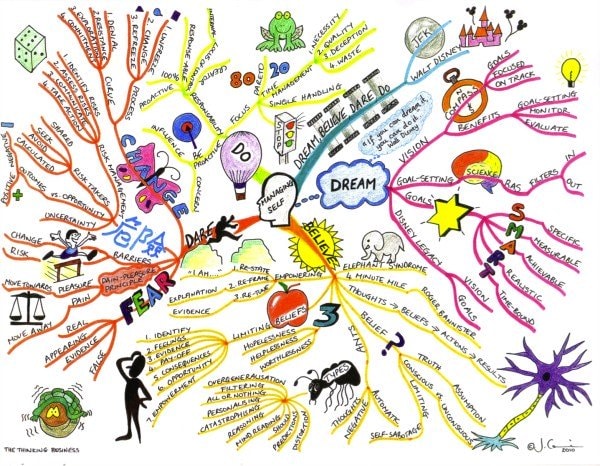Things that should be taught in every school
As a famous writer and blogger, Mark Manson has many articles sharing his unique perspective on life. Among them, this young author has an article “5 things that should be taught in every school” that adds to the missing things in the current education system. Below is his article on this issue.
Let's be honest: Our education system sucks.
Most of the important history I learned in 5th and 12th grade can be found on Wikipedia and understood in a few weeks. And most of the basic science is explained in great detail in YouTube videos. On top of that, we have the most unstable job market in 100 years. Technology is evolving at a breakneck pace and robots will do half of the jobs within a decade. College degrees are debatably worthless. Every 6 months, a new industrial and technological invention is born.
 |
Learning how to avoid falling apart in relationships and learning how to control yourself well, express your emotions and love is a life changing skill. |
Yet we still push our children to school to learn the same curriculum their grandparents went through.
It's time to realize that most of the important things you learn in life don't come from school. For me, the important things I learned were on my own as an adult.
But why aren’t these things taught in school? If I spend six months learning about Chaucer and Renaissance painting, why shouldn’t I spend the same six months learning about saving for retirement and what sexual consent is? Or why didn’t anyone tell me that when I became an adult, most of my work would be done by robots or outsourced?
Where are those classes? What classes should we have taken in high school? In my opinion, there are 5 things we should learn right away.
1. Personal finance
Curriculum should include: Credit cards, interest rates, credit ratings, and retirement accounts.
Why should you start saving $100 a week when you turn 18? Because between then and 50, you will have four times that amount. That’s a lot of money. Why didn’t I know about this until I was 24?
Why this matters: Since the average American family carries over $15,000 in credit card debt each month, 36% of working Americans have no savings for retirement.
Financial illiteracy is a huge problem. Because as you can see, a society filled with people buying things they can’t afford, retiring without savings, getting sick and not being able to pay for medical bills – this scenario seems to be exactly what’s happening.
2. Relationship management
The curriculum should include: Communicating, expressing one's feelings without blaming or judging others; knowing how to spot manipulative behavior and knowing when to stop; personal boundaries and not being a pushover; honest discussions about sex; issues related (or not related) to love and how to experience the differences between men and women.
Most of these problems we learn by going through the pain of breakups.
Why this matters: Because when you're lying in bed dying of cancer, you won't be thinking about how Napoleon overcame his jealousy in Russia, or how the Meiji coup changed the entire face of Asian geopolitics, or how organic compounds are slowly rotting your brain.
You will only think about the people you love in your life and the people you have lost.
There are many things that make up a happy life, but few things influence and impact our happiness as much as our relationships. Learning to avoid relationship setbacks and learning to control ourselves, express our emotions and love is a life-changing skill.
As humans, we are social creatures. We do not exist in a vacuum. We cannot. Social ties are woven into the tapestry of our lives.
3. Logic and logical reasoning
The curriculum should include: Is the following question true or false - If all Bs are Cs and all Cs are Ds, then all Ds are Bs.
The answer, of course, is “false.”
Questions like these are always annoying on standardized tests. However, our ability to think through these questions correctly will increase our confidence in our ability to lead our own lives.
 |
Our ability to think through answering these questions correctly will help increase our confidence in our ability to lead our own lives. |
For example, following the same logic as the above sentence, in reality there is the following example: “Cindy always causes trouble at the office. Cindy is a woman. Therefore, women often cause trouble at the office.”
Of course these are all false. You see them in the media, debated by leaders, and held by many people.
Those things are called fallacies.
Why it matters: We often make logical fallacies, often without even realizing it, even about important life-and-death decisions or beliefs. These fallacies are present in political campaigns (X makes good money, the government needs more money, therefore X needs to be in government) or moral issues (Bob lied to me, therefore I should lie to Bob)…
These logical fallacies infiltrate our lives causing us to make poor decisions about health, relationships, careers, and more.
These problems in school we are not taught how to think or solve problems. Instead we are taught how to copy and memorize things. And then, we forget them immediately. This poor way of thinking follows us in all the complexities of life.
4. Self-awareness
The curriculum should include: “How can I become self-aware?” you might ask. But really, this subject can be taught and practiced like any other subject.
Self-awareness is the ability to think about what you think. It is the ability to feel about your feelings, to have a perspective about your perspectives.
For example, I might have the thought, “I hate all people named Steve. People named Steve are all bad people.”
This is a classic example of bigotry, a simple form of revenge through generalization. If you lack self-awareness, you are likely to be biased towards superficial values.
But for those with full self-awareness, they will ask themselves: “Why do I hate people named Steve? Is it because my ex-boyfriend is named Steve? Is it because my dad is named Steve? And am I taking my anger out on the Steves of the world? If so, how shameful is that?”
This feeling of one's thoughts is called self-awareness. Very few people have such a moment in their life.
But this can be learned like anything else through practice. Simply ask yourself to think what you think, feel what you feel, and develop your self-awareness.
Why it matters: Because high self-awareness has many benefits in life. People who develop this skill are better planners, more disciplined, more focused, more in tune with their emotions, make better decisions, and are better able to anticipate potential problems ahead.
Self-awareness is an important factor in maintaining relationships.
Maybe you are irritable or prejudiced, maybe you are isolated, maybe you are impulsive or a bad person… Whatever the case, we need to understand ourselves and find ways to control and adapt.
5. Skepticism
The curriculum includes: Why is everything we believe wrong in some way? Why is memory often unreliable? Why are precise fields like math and physics riddled with unsolvable problems? Why do we often make wrong judgments about what made us happy/unhappy in the past/future? Why do strongly held beliefs often lead to crime and violence, rather than the other way around?
 |
| Why is everything we believe wrong in some way? Why is memory so unreliable?... |
Much of today's scientific knowledge is based on studies that failed many times in the past until they were confirmed to be correct...
Why it matters: Most of the good things in life come from a period of uncertainty. Uncertainty makes you curious, willing to explore and test different ideas, and to exchange ideas with others. It makes you humble and makes you look at others without prejudice.
Most bad things in life come from being too certain: complacent, arrogant, stubborn, prejudiced. People don’t drink poison together because they’re not sure about something. Governments don’t starve or kill millions of people because they’re not sure about something. They do it because they’re sure about what they’re doing…
Life thrives on the flow of uncertainty. Certainties are just strategies we adopt to avoid that flow. Because education and learning should not stop when the textbook is closed or when the degree is received, but should accompany us throughout our lives.
According to VNN
| RELATED NEWS |
|---|

